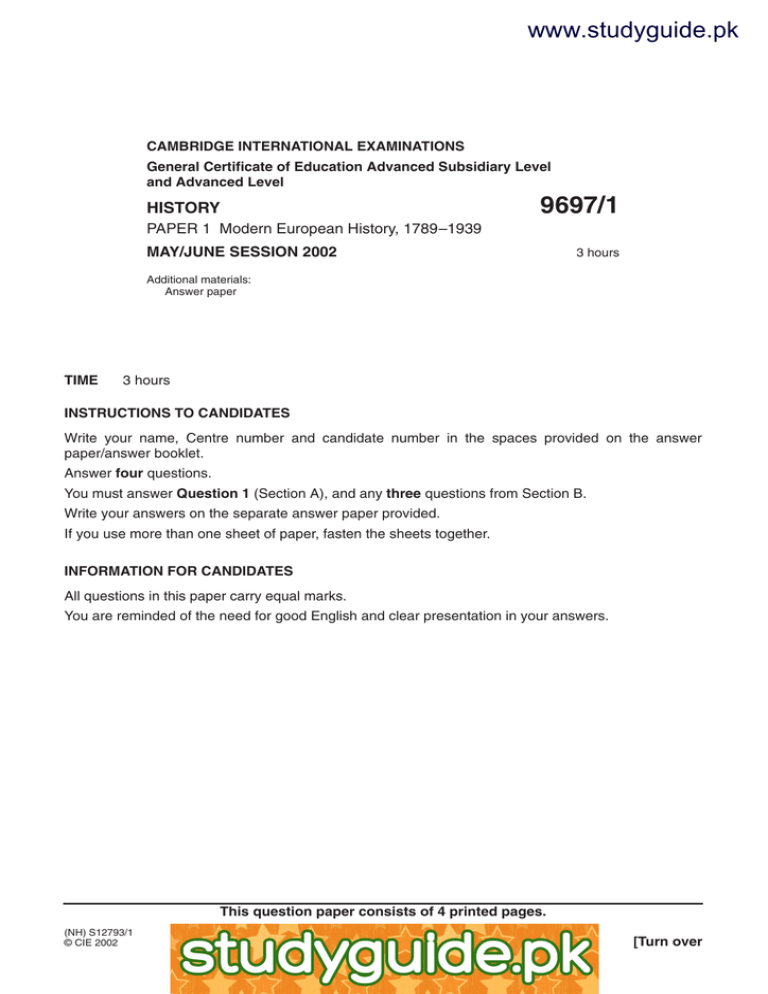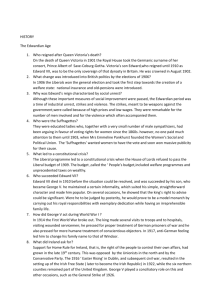www.studyguide.pk
advertisement

www.studyguide.pk CAMBRIDGE INTERNATIONAL EXAMINATIONS General Certificate of Education Advanced Subsidiary Level and Advanced Level HISTORY 9697/1 PAPER 1 Modern European History, 1789–1939 MAY/JUNE SESSION 2002 3 hours Additional materials: Answer paper TIME 3 hours INSTRUCTIONS TO CANDIDATES Write your name, Centre number and candidate number in the spaces provided on the answer paper/answer booklet. Answer four questions. You must answer Question 1 (Section A), and any three questions from Section B. Write your answers on the separate answer paper provided. If you use more than one sheet of paper, fasten the sheets together. INFORMATION FOR CANDIDATES All questions in this paper carry equal marks. You are reminded of the need for good English and clear presentation in your answers. This question paper consists of 4 printed pages. (NH) S12793/1 © CIE 2002 http://www.xtremepapers.net [Turn over www.studyguide.pk 2 SECTION A: The Origins of World War I, 1870–1914 You must answer Question 1. BRITISH POLICY BEFORE WORLD WAR I 1 Read the sources, and then answer the question. Source A The British Navy should be increased so as to enable us to meet three Powers at sea in superior numbers. The naval policy and avowed hostility of Germany, to which even the British official world can no longer remain blind, will force us to keep on a war-footing in the North Sea as powerful and efficient a fleet as the Mediterranean or Channel Squadrons. The money required will be available. Some of us think that our present annual expenditure of sixty million pounds on national defence would supply us not only with the Army, but also with the Navy we need. However, others are absolutely certain of it. Unification turned Germany into a military camp and Germany, having exhausted her military ambition in Europe, is now seeking new worlds to conquer on the ocean. Perhaps the main fact which should impress itself upon the British in considering the actual international outlook is not merely the extraordinary growth of Germany – which has achieved greatness by trampling on her neighbours – but the fact that this powerful country is becoming increasingly dependent on a foreign food supply, as well as on foreign supplies of raw and partially manufactured articles. This necessarily involves the development of Germany as a Sea Power, and it is a matter for every European State to think about. Germany is already stronger at sea than either France or Russia. An anonymous article in the British Conservative journal, National Review, 1901. Source B The French ambassador asked me whether, if Germany attacked France over Morocco, France could rely on Britain’s armed support. I said that I could not answer this question. I was sure that there would be strong sympathy by the British public but I could not say more and could promise only diplomatic support. The French ambassador said that there would be no danger of war at all if the Kaiser knew that we should fight to help France. I said that it was one thing if Germany thought that Britain would join in a war; it was a different thing to make a formal agreement to do so. The French ambassador mentioned neutrality and I said at once that I would promise neutrality – benevolent neutrality – but that was all. Notes on an interview between Sir Edward Grey, British Foreign Secretary, and P. Cambon, the French Ambassador, 1906. Source C I told Count Benckendorff, the Russian ambassador, what I had said to the German Ambassador this morning about the possibility of Germany, Italy, France and ourselves working together with Austria and Russia to secure peace after Austria and Russia had mobilised. He was very concerned that what I said would give Germany the impression that France and Britain were detached from Russia. 9697/1 M/J/02 www.studyguide.pk 3 I said that Britain and France would be no more detached from Russia than Germany would be detached from her ally Austria. I had emphasised to the German ambassador that Germany’s involvement in any diplomatic mediation was an essential condition, and surely the situation would not be unsatisfactory for Russia if France and Britain held back, provided that Germany also held back. Benckendorff urged that I should make Germany think that Britain would not stand aside if there was a war. I said that I had given no indication that we would stand aside. I have no doubt that I have made the best proposal in the interests of peace. Official record by Sir Edward Grey, British Foreign Secretary, of his meeting with Count Benckendorff, the Russian ambassador, July 1914. Source D In July 1914, Sir Edward Grey, the British Foreign Minister, begged us to come forward with a proposal of our own. We insisted on war. The impression grew continually stronger that we desired war under any circumstances. It was not possible to interpret our attitude in any other way. Then, Sir Edward decided to give his famous warning. I replied that I had invariably reported that we should have to reckon with British opposition if it came to a war with France. Repeatedly Sir Edward said to me, ‘If war breaks out, it will be the greatest catastrophe the world has ever seen.’ Prince Lichnowsky, German Ambassador to Britain, Memoirs, written in the 1920s. Source E No one in Britain really wanted war. But Britain did fear our growing political and military power. It felt its supremacy and security threatened by the growth of our battle fleet and they believed that we intended to gain supremacy in continental Europe. In order to prevent such possibilities and prevent Germany becoming the permanent master of Europe, the Triple Entente was founded when the attempt to agree an alliance failed. Undoubtedly, Britain underestimated the danger of dividing Europe into two hostile alliances. When it realised the danger, Britain was too closely linked to its partners in the Entente and could not change the policies of its allies. Britain was ultimately dependent on the decision of its allies, without wishing it. E. Brandenburg, a German historian, writing soon after 1918. Now answer the following question. ‘War would have been less likely in 1914 if Britain had taken a stronger stance against Germany.’ Use Sources A-E to show how far the evidence confirms this statement. 9697/1 M/J/02 [Turn over www.studyguide.pk 4 SECTION B You must answer three questions from this section. 2 Explain why Napoleon Bonaparte was able to establish a strong autocratic government in France. 3 Assess the political and social effects of industrialisation on Europe in the nineteenth century. (You should refer to developments in at least two of Britain, France and Germany in your answer.) 4 Why was Cavour more successful than Mazzini in uniting most of Italy? 5 Why did European nations become more interested in expanding their empires in the later years of the nineteenth century? 6 From 1906 to 1914, how stable was Nicholas II’s regime in Russia? 7 Why, to 1939, did many Germans support Hitler and his Nazi dictatorship? 8 To what extent did Lenin and Stalin, to 1939, establish a Marxist regime in the Soviet Union? 9697/1 M/J/02







